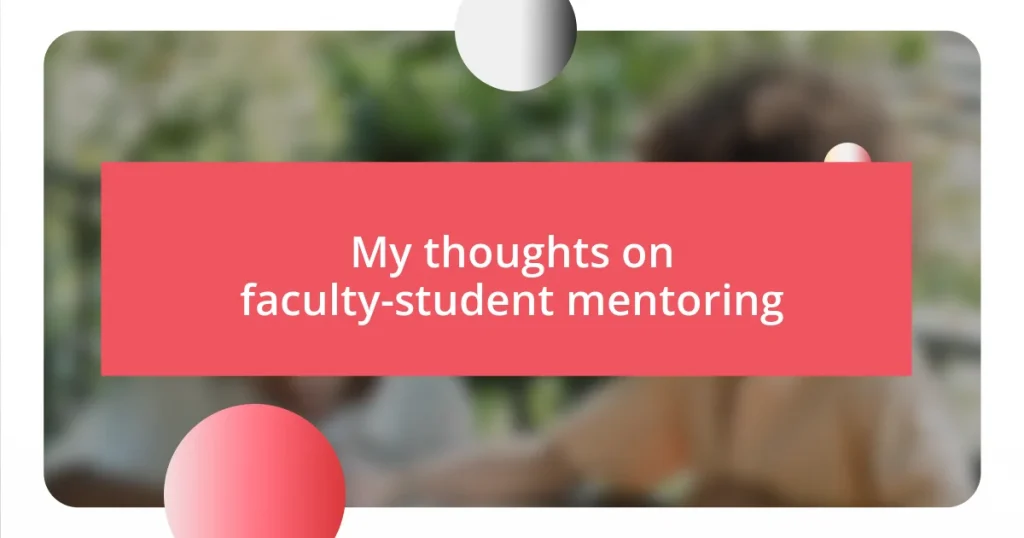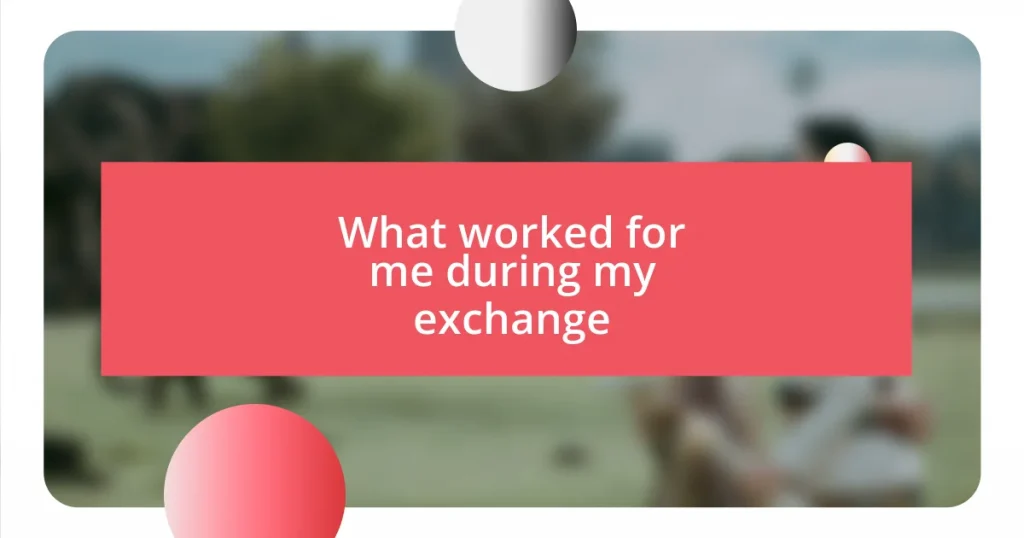Key takeaways:
- Mentoring relationships provide vital support, guidance, and foster a sense of belonging, greatly impacting the mentee’s personal and academic growth.
- Key benefits of faculty-student mentoring include personalized career guidance, networking opportunities, emotional support, skill development, and increased student engagement.
- Effective mentoring practices involve establishing clear expectations, creating a safe space for communication, being adaptable, and celebrating progress and setbacks together.
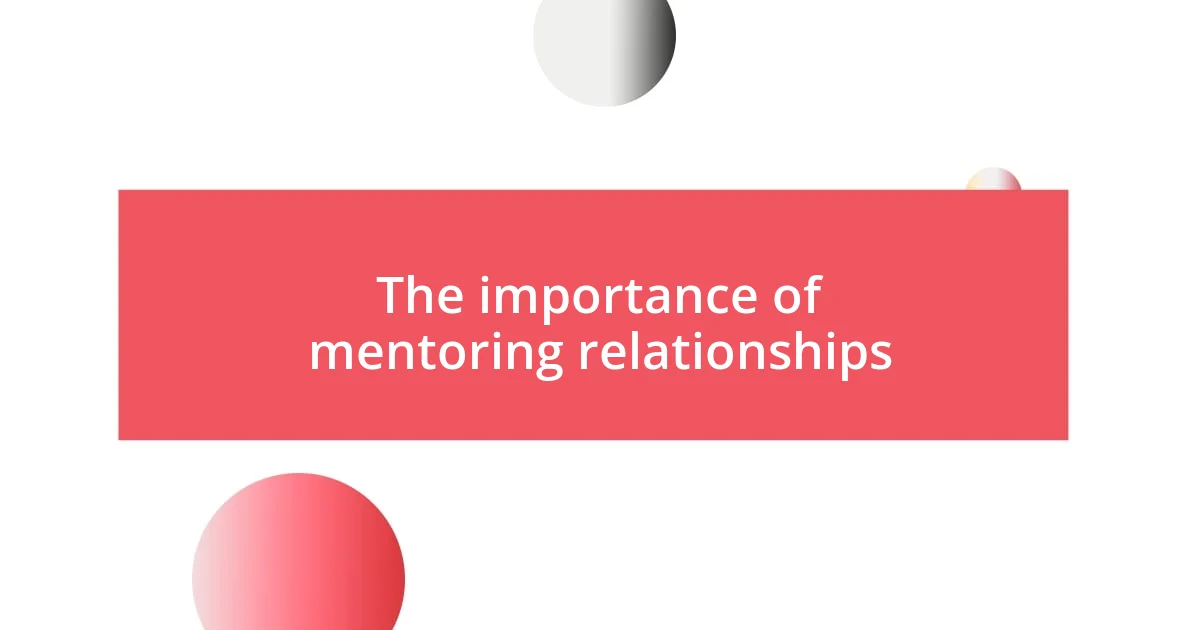
The importance of mentoring relationships
When I think about the importance of mentoring relationships, I immediately recall my own experiences as a mentee. I remember feeling lost in my first year of college, unsure of my path. My mentor stepped in not just as a guide, but as someone who genuinely cared. Their support opened my eyes to opportunities I hadn’t considered before. Isn’t it remarkable how one person can change the trajectory of your life?
Mentoring relationships serve as powerful beacons of support and guidance. They can provide invaluable insights that textbooks simply can’t offer. For instance, my mentor once shared a story about a project failure that initially seemed devastating but ultimately turned into a valuable lesson. That moment taught me that failure isn’t the end; it’s a stepping stone. How often do we need to hear that lesson to truly absorb it?
Moreover, these relationships can foster a sense of belonging and community. Whenever I see a mentor and mentee engaged in deep conversation, I’m reminded of the bond that forms through shared experiences. It’s a dynamic that not only benefits the mentee but also revitalizes the mentor. Don’t you think that mentors learn just as much from their mentees, creating a cycle of growth and understanding?
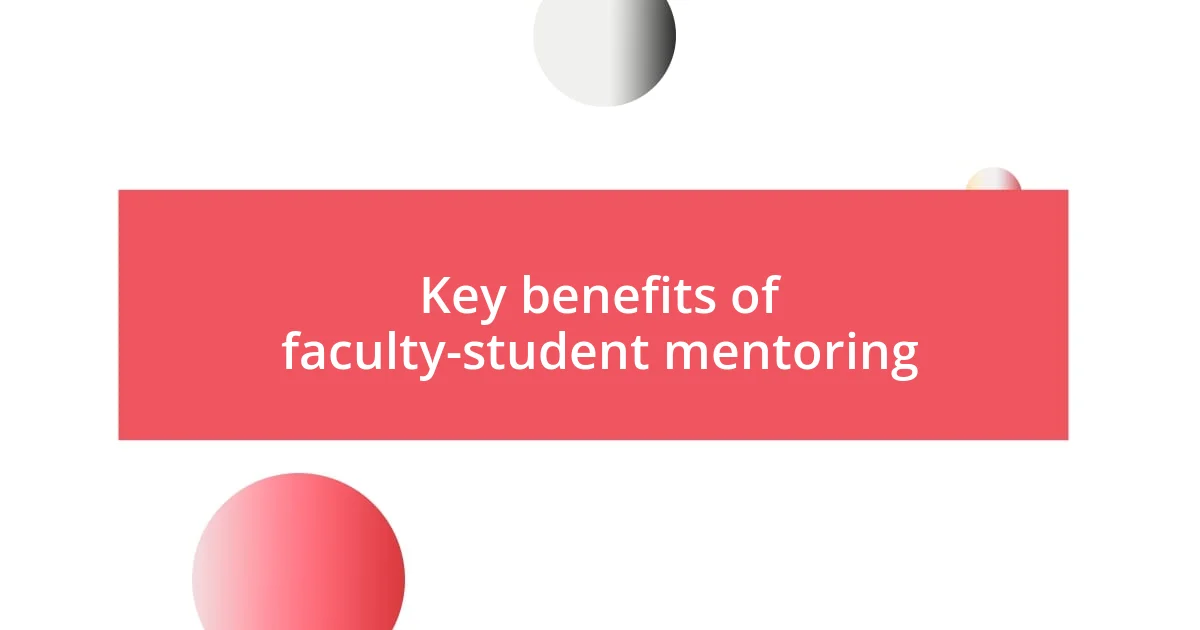
Key benefits of faculty-student mentoring
The benefits of faculty-student mentoring are profound and multifaceted. One key advantage is the personalized guidance mentors offer, which can help students navigate both academic and career paths effectively. I’ve watched countless students transform their aspirations into actionable plans simply because they had someone by their side to provide feedback and encouragement. It’s like having a compass that not only points you in the right direction but also reminds you that it’s okay to ask for help along the way.
Here are some key benefits to consider:
- Career Guidance: Mentors share insights about various career trajectories that can inform students’ choices.
- Networking Opportunities: Faculty often have extensive professional networks, opening doors for students.
- Emotional Support: Having a mentor can help students manage the stresses of academia, fostering resilience and well-being.
- Skill Development: Through mentoring, students can hone essential skills, such as communication and problem-solving.
- Increased Engagement: A strong mentor-mentee relationship can boost a student’s engagement and enthusiasm for their studies, which I’ve seen lead to improved academic performance.
Reflecting on my own journey, there was a moment when a simple coffee chat with my mentor led to an internship opportunity I hadn’t even considered. It reminded me that mentors often see potential in us that we don’t yet recognize ourselves. I believe this perspective can truly empower students to embrace their unique paths and talents.
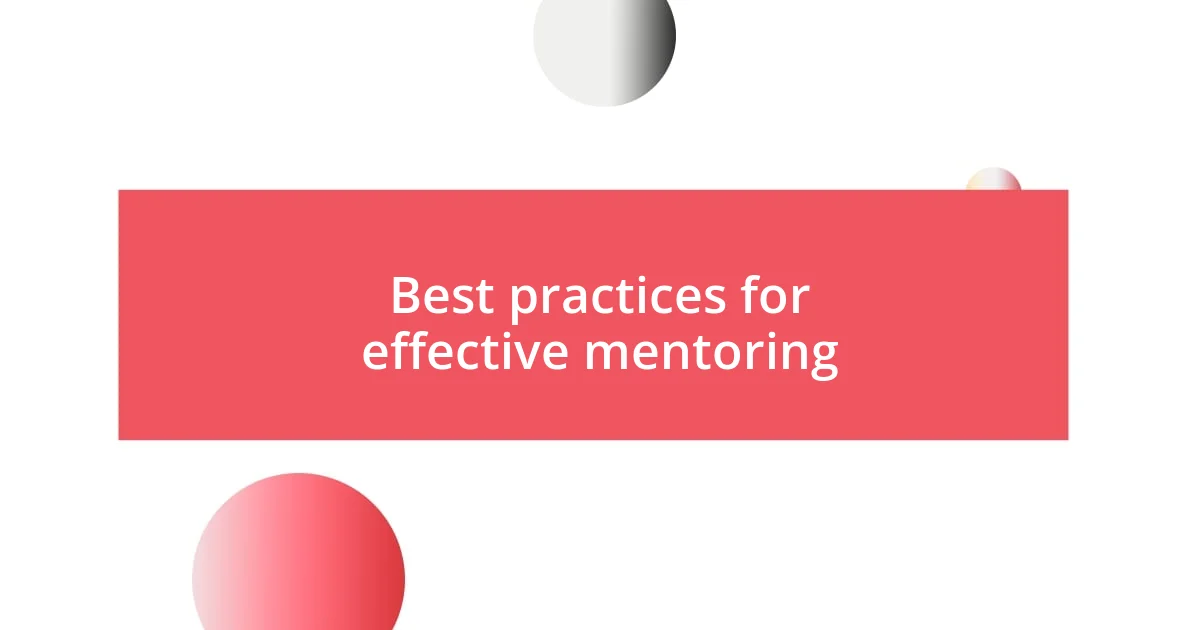
Best practices for effective mentoring
Effective mentoring is an art that can greatly benefit both the mentor and the mentee. One best practice that I’ve found invaluable is establishing clear expectations from the start. When I first began mentoring, I made the mistake of assuming we were on the same page. But once we laid out our goals, timelines, and communication methods, the relationship took on a whole new depth. It was like tuning an instrument for a harmonious melody, rather than fumbling through a cacophony of misunderstandings.
Additionally, creating a safe space for open communication is essential. I remember a time when a mentee hesitated to share their struggles with me, fearing judgment. Once I shared my own challenges and mistakes, it broke down that wall. This mutual vulnerability fostered a strong bond and encouraged my mentee to be open about their journey. The best mentoring relationships flourish in an environment where both parties feel comfortable sharing their thoughts and feelings.
Lastly, I cannot stress the importance of being adaptable. Each mentee needs a tailored approach; what works for one may not resonate with another. I once mentored a student who thrived on constructive criticism, while another found inspiration in a more supportive, nurturing style. By being flexible and attuned to their individual needs, I witnessed remarkable progress. Isn’t that the beauty of mentoring? It’s about recognizing the uniqueness of each relationship and nurturing it in a way that promotes growth.
| Best Practice | Description |
|---|---|
| Establish Clear Expectations | Lay out goals and communication methods to avoid misunderstandings. |
| Create a Safe Space | Encourage open communication by sharing personal challenges and fostering vulnerability. |
| Be Adaptable | Tailor your mentoring style to fit the individual needs of each mentee. |
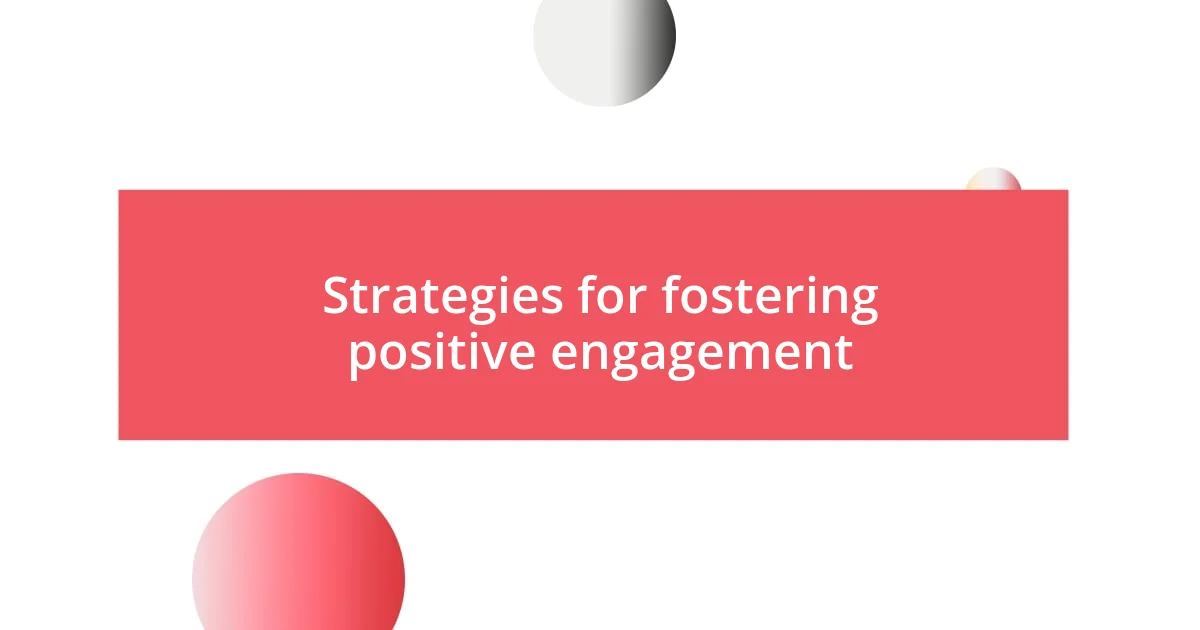
Strategies for fostering positive engagement
Fostering positive engagement in mentoring relationships starts with creating genuine connections. I vividly remember meeting my mentor for the first time—there was a moment when we both shared our favorite books. Instantly, a bond formed, and I realized that building rapport can stem from simple, shared interests. It made me wonder: how often do we overlook the power of common ground? This connection laid a foundation of trust that made our more serious discussions later feel comfortable and productive.
Another strategy I’ve found effective is incorporating regular check-ins. I recall a time when I implemented weekly short calls with my mentee, just to see how things were going. Those quick chats transformed into meaningful dialogues, allowing us to celebrate small victories and tackle challenges collaboratively. It’s surprising how much progress can be made in casual conversations, wouldn’t you agree? By prioritizing consistent communication, we keep the momentum going and strengthen our partnership.
Lastly, I advocate for celebrating both milestones and setbacks together. I learned this early on in my mentoring journey. During a particularly tough exam period, my mentee felt defeated after receiving some grades that didn’t reflect their effort. Instead of glossing over it, we took time to analyze what went wrong and strategize for improvement. That experience was like a turning point—transforming frustration into valuable lessons. Reflecting on this, I’ve come to believe that each struggle shared deepens the mentorship bond, bringing a sense of solidarity that can motivate both parties.
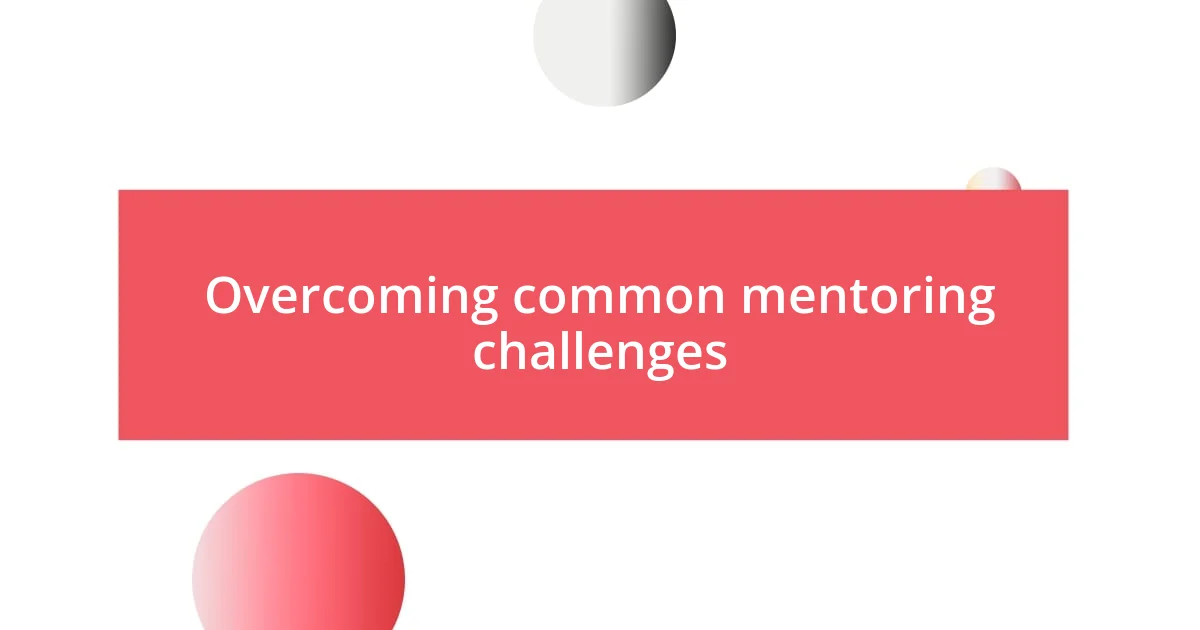
Overcoming common mentoring challenges
Navigating common mentoring challenges requires proactive strategies and a willingness to adapt. One of my early challenges was managing time effectively. I remember feeling overwhelmed during midterms; my mentee was balancing multiple projects while I was caught up in my responsibilities. We decided to have shorter, focused meetings, which allowed us to tackle the most pressing issues without feeling rushed. This not only alleviated pressure but also encouraged my mentee to come prepared, transforming those sessions into productive discussions. How often do we overlook the value of quality over quantity?
Another hurdle I faced was dealing with mismatched communication styles. In one instance, I had a mentee who preferred text-based discussions, while I naturally leaned towards face-to-face interactions. It created a bit of friction at first. Recognizing this, I suggested alternating between in-person meetings and messaging through a platform we both enjoyed—this compromise significantly improved our connection. Isn’t it fascinating how simply adjusting our approach can enhance understanding?
Lastly, I learned that tracking progress through feedback is crucial for both mentor and mentee. Early in my mentoring experience, I didn’t prioritize this, thinking recognition would come naturally. However, when I started conducting informal feedback sessions, I noticed an incredible difference. One mentee expressed that recognizing small improvements spurred their motivation. It was a lightbulb moment for me—could regular check-ins be the key to unlocking potential? I believe it is essential to build a feedback loop that reinforces growth and acknowledges achievements, whether big or small.
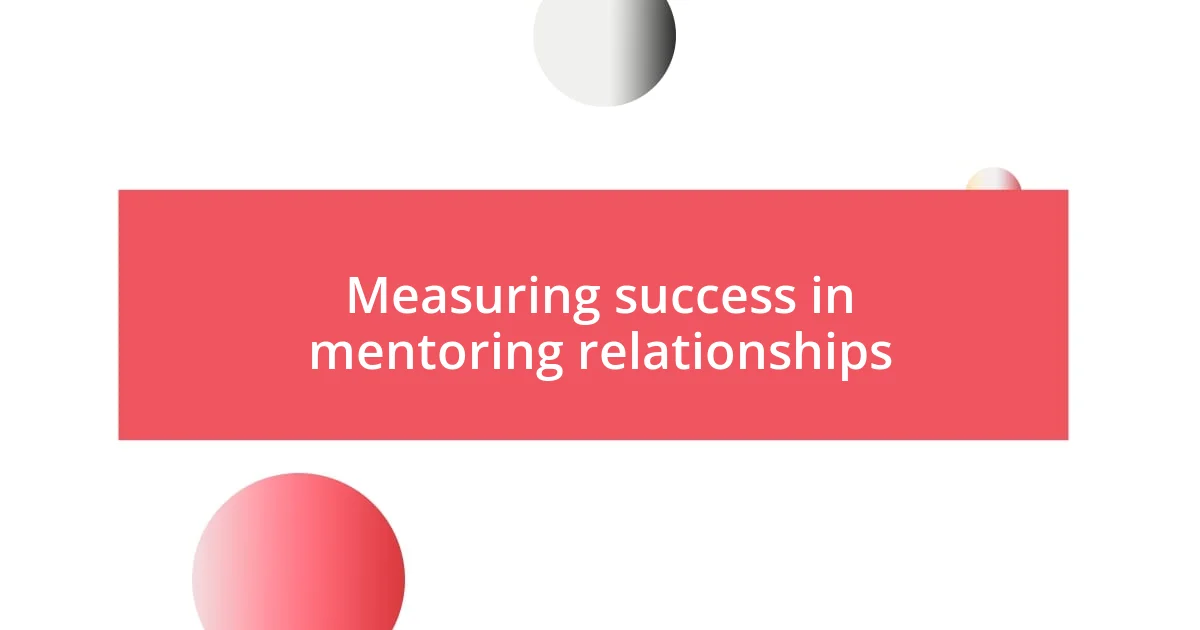
Measuring success in mentoring relationships
Measuring the success of mentoring relationships can sometimes feel elusive. Early in my mentoring experience, I focused solely on academic performance as a metric. However, I soon realized that success is multidimensional. One of my mentees expressed that they felt more confident in their abilities. This reflection was a game-changer for me; it illuminated how personal growth could be just as valuable as grades.
I also learned the importance of setting specific goals together with my mentee. During one of our sessions, we crafted a roadmap that included both academic aspirations and personal development milestones. The thrill of checking off those achievements brought us both joy. It’s incredible how shared goals foster commitment, isn’t it? This allowed us to celebrate progress as a team, deepening our connection and ensuring we were both on the same path.
Another aspect I’ve found essential for measuring success is soliciting regular feedback from my mentee. Initially, I was hesitant to ask for their thoughts—fearing it might lead to discomfort. Yet, once I did, I discovered it opened a pathway for honest communication. One time, a mentee shared that our interactions felt too structured and would benefit from more spontaneity. That insight helped me adapt our sessions, ultimately leading to a more enriching experience. Wouldn’t you agree that understanding perspectives from both sides can elevate the mentoring journey?










